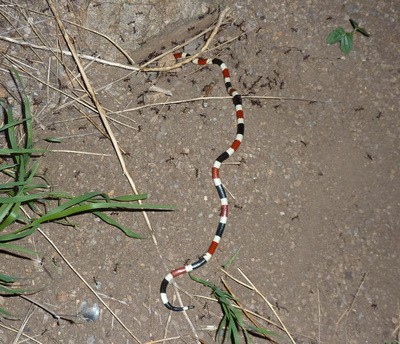If you happen to be unfortunate enough to be bitten by a coral snake at this point in time, you may arrive at the hospital only to find that there is no antivenom, according to Dr. Leslie Boyer of the UA Venom Immunochemistry, Pharmacology and Emergency Response Institute.
A team of scientists and student researchers from the VIPER Institute are working to fix that problem. The team is developing a new antivenom for the treatment of coral snake bites. The drug is currently in clinical trials in hospitals in Florida.
Boyer, the founding director of the VIPER Institute and a lead scientist on the coral snake antivenom project, said although it hasn’t enrolled enough patients yet to say anything definitively, the clinical trials the institute has conducted so far look promising.
“Our first 20 patients have done so well that our findings so far are compatible with the expectation that antivenom for coral snake bite will prevent people from going into paralysis and respiratory failure,” Boyer said.
The antivenom is made from antibodies produced by horses, according to Anne Wertheimer, director of VIPER Diagnostics Laboratory. Wertheimer said the horses are exposed to very small doses of coral snake venom to trigger an immune response, causing the body to produce antibodies that are then harvested from the horse’s blood, purified and used to make antivenom for humans.
“Antibodies are basically the body’s way to fight something,” Wertheimer said. “That gives you a very broad approach for neutralizing toxins.”
RELATED: Bugging out at the 2016 Insect Festival
Wertheimer said there are many different aspects of the coral snake venom that are harmful to humans. Using natural antivenom from animal antibodies neutralizes all harmful aspects of the venom because that’s exactly what the antibodies were designed to do.
Getting FDA Approval
Although the U.S. Food and Drug Administration originally approved the current stores of antivenom for use until 2007, they recently extended the expiration date to April 2017. But there’s no saying when it will run out due to the low volume of cases and lack of profitability for the drug, according to Boyer.
Boyer said he and his team hope their drug will be able to fill this gap sooner than later. But in order to do that the team will have to collect enough evidence to prove to the FDA that the drug is both safe and effective.
Boyer said this has been challenging because the old antivenom, although long past its original expiration date, is still available in most hospitals. This means that if someone is bitten and goes to a hospital that still has the old drug, they won’t participate in the clinical trails for the new drug.
RELATED: UA researchers creates Kidenga: crowd sharing app for viruses
In addition to clinical trials on humans, the team has studied the interaction between coral snake venom and the new antivenom in the blood of sedated sheep.
The team plans to present its findings to the FDA in the next few months. Boyer said that if the team can combine evidence from its clinical trials, the animal studies and reviews of historical studies the FDA may approve the drug.
“I think the FDA shares very strongly in the goal of taking good care of the public health,” Boyer said. “If the evidence we’ve been able to muster is sufficient to prove our case, I think it’s very likely the they’re going to help us to take care of people.”
If the evidence isn’t sufficient, which Boyer said is possible, the researchers will have to continue and expand their study. The team will need to prove that it can safely and consistently produce the antivenom on a large scale before the FDA will license it for use, which can sometimes take years.
But Boyer said if the old antivenom runs out before the new one is approved, the researchers may be able to continue providing the new antivenom as a public service.
“It’s important when you’re talking about a lifesaving drug to do it right, and that’s how you do it right,” Boyer said.
Follow Michaela on Twitter.
.









